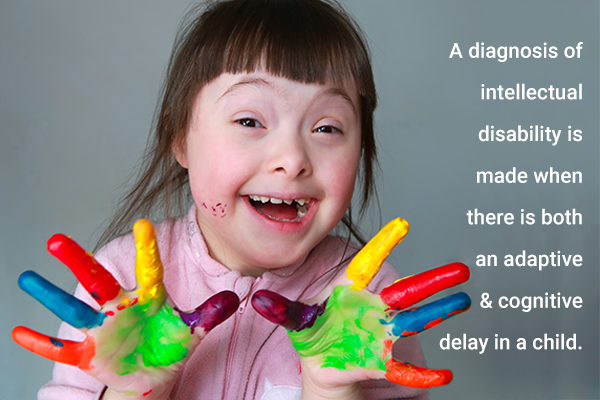In this article:
Children with intellectual disabilities have a hard time adjusting to the world, and this inability to cope often makes them act out in an aggressive manner.

Their stunted mental growth sets them behind academically and prevents them from interacting with their peers. This leads to feelings of frustration, isolation, and inferiority, all of which come out sometimes through abnormally volatile behavior.
In such a case, it is incumbent upon the parents and caregivers to establish a connection with their child and create a safe environment for him/her. Special needs children require special care, which you will not find in a regular parenting guide. The normal rules don’t apply here, and strictness will not quell your child’s turmoil but aggravate it.
Parents must first educate themselves about the disability through proper sources and a behavioral therapist, why it happens, what it entails, and how to manage it to give the child the help he/she needs.
Major Causes of Intellectual Disability in Children
Intellectual disability (ID), previously known as mental retardation, has many causes:
- Prenatal causes include genetic abnormalities, toxin ingestion such as alcohol and drugs, and infection such as herpes.
- Perinatal causes include hypoxia and complications of prematurity. (1)
- Postnatal causes include brain injury, toxin ingestion such as lead, and severe malnutrition.
Lead is the most common environmental cause, (2) cytomegalovirus (CMV) (3) is the most common viral cause, alcohol is the most common teratogenic cause, (4) and trisomy 21 and Down syndrome (5) are the most common chromosomal causes of ID.
Signs That a Child Has Intellectual Disability

In children under the age of 2 years, missed developmental milestones can be the first signs of ID, but this is usually the more severely affected children.
Children with mild ID may not be identified until school age when they are unable to keep up academically. While gross motor milestones are usually met on time, receptive language delays are almost always present.
A diagnosis of ID is made when there is both an adaptive and cognitive delay in a child. Depending on the severity of the ID, early receptive language delays are some of the first signs of ID.
Aggressive Tendencies in Children With Intellectual Disabilities
Only a small (~3%) percentage of children with ID have an additional psychotic disorder, and most aggressive behaviors cannot be attributed to a specific additional diagnosis. (6)
Aggressiveness in children with ID is usually caused by frustration and anger from the inability to communicate their needs and wants. It also sometimes stems from the inability to meet social and academic expectations.
Aggressive behaviors are more common in severe to profoundly affected children. This aggression can be directed toward self, others (usually close family), or property. Self-injurious behaviors include hitting their head with their fists or against the wall or biting fingers or forearms. There can also be high levels of agitation without any physical aggression towards people or objects. (6)
Treating Aggressive Behavior in Children With Intellectual Disability
Antipsychotic medications are usually used to treat aggressive behaviors in children with ID. (7) Anti-anxiety medication can also be used when the source of aggression can be traced to an increase in anxiety.
A detailed medical history is needed so as not to misdiagnose or over-treat the child. Behavioral management will include a long-term treatment plan for both the child and parent.
Useful Techniques to Calm Your Child During an Aggressive Episode

It is best to work with a behavioral therapist to manage aggressive behaviors. Every child is unique in what calms them and what makes them happy.
Create an enriching and safe home and academic environment. Understanding the child’s triggers and having meetings with teachers to discuss your child will make both home and school a place your child wants to be in.
Giving alternative means to take out their frustrations before it grows into aggression is a good way to show the child that it is okay to get angry sometimes and that they just need to react in a certain way about it.
Having a consistent parenting style, especially when parents are separated, or extended families such as grandparents are involved, is important in showing stability in rules to a child. When expecting agitation, such as taking a flight, slow desensitization and trip planning with the physician are important.
Special Care for Children With Intellectual Disability
Assume competence. ID is a complex diagnosis and cannot be boiled down to simple distinctions such as mild or moderate. The child understands more and is capable of more than what most assume of them.
Special care must be taken to communicate with the child at their developmental level and to give them as much agency as possible. Also, safety is an important factor, and depending on the developmental status of the child, various safety measures need to be taken so that school and home are safe places for them to be. (8)
Activities to Engage Your Intellectually Disabled Children
Spending quality time with your children, whether they have ID or not, is a great way to build a long-lasting relationship with them. Children with ID are surrounded by therapists and coaches all day that spending time with their families just for fun becomes a low priority at the end of the day.
Meet your child where they are developmentally and have fun. Whether that’s playing a board game, taking a walk in the park late at night, playing a video game with them, or reading together – doing something they’ll enjoy is most important in helping build a trusting and long-lasting relationship.
Expert Insights About Managing Aggressive Tendencies in Intellectually Disabled Children

There is a lot of focus in setting up support services for parents to help them adjust to having and raising a special needs child, but there is little training or support directed toward the teaching staff.
Appropriate training and support for the school systems that take care of special needs children are a must if we are to create a cohesive world for them. Children spend most of their day at school, and if they have anxieties and frustrations building through the day, it will worsen their behaviors at home. (9)
Final Word
Be patient with yourself as a parent. Aggressive behaviors can strain your patience, hurt you physically, and worst of all, strain your relationship with your child.
Finding a good behavioral therapist and a patient physician who will appropriately regulate the child’s medication and treatment is necessary. Parents are allowed to have bad days; they are allowed to be exhausted. Make sure to take time for yourselves and ask for help.
Having a support system is very important in running this marathon, and having other parents who are going through the same thing or have gone through it and now can mentor you through it is also important. (10)
- Was this article helpful?
- YES, THANKS!NOT REALLY


